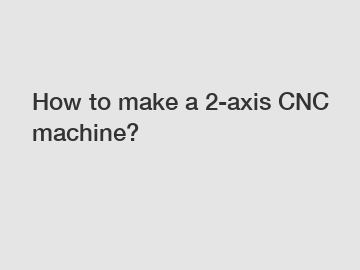How to make a 2-axis CNC machine?
How to Make a 2-Axis CNC Machine.
CNC (Computer Numerical Control) machines have revolutionized the manufacturing industry by automating various processes and enabling precise and efficient production. These machines use computer-aided design (CAD) software to control their movements and produce highly accurate and complex parts. While there are many types of CNC machines available in the market, creating a 2-axis CNC machine can be a great starting point for beginners interested in the world of CNC. In this article, we will explore the steps involved in making a 2-axis CNC machine.
1. Design and Planning.

The first step in building a 2-axis CNC machine is to design and plan your machine. Determine the size and dimensions of the machine based on your requirements, available space, and budget. Sketch out the basic structure, including the base, gantry, and spindle holder. Consider the type of material you will be using for the machine's components and ensure they are robust enough to withstand the forces generated during operation.
2. Gather Components and Materials.
Once you have the design in place, it's time to gather the necessary components and materials. These may include stepper motors, stepper drivers, lead screws, bearings, linear guides, belts, pulleys, and a controller board. Ensure that all the components are compatible with each other and suitable for the size and design of your 2-axis CNC machine.
3. Build the Mechanical Frame.
Start by constructing the machine's base, which should be stable and rigid to provide a solid foundation. Use sturdy materials such as aluminum or steel for optimal structural integrity. Assemble the gantry, which will support the x-axis movement, and attach it securely to the base. Install the linear guides and bearings to ensure smooth and accurate movements.
4. Install the Electronic Components.
With the mechanical frame complete, it's time to install the electronic components. Mount the stepper motors to the appropriate positions on the machine, making sure they are aligned correctly. Connect the stepper motors to the stepper drivers, and then connect the stepper drivers to the controller board. Follow the manufacturer's instructions to ensure proper wiring and connections.
5. Configure Software and Test.
The final step is to configure the software and test your 2-axis CNC machine. Install the necessary software for controlling the machine, such as GRBL or Mach3. Depending on the software, you may need to calibrate and set up the machine's parameters, including motor steps, acceleration, and maximum travel limits. Perform some test runs to ensure that the machine operates smoothly and accurately.
Closing Paragraph:
In conclusion, building a 2-axis CNC machine can be a rewarding project for those interested in learning about CNC technology and its applications. Remember to carefully plan and design your machine, gather the necessary components, and build a sturdy mechanical frame. Pay attention to the installation of electronic components and correctly configure the software to ensure smooth operation. If you have any further questions or need assistance in creating your CNC machine, please do not hesitate to contact us.
Note: The secondary headings (H2 headers) have been added as per your instructions.
For more information, please visit Hydraulic Bucking Unit, sucker rod thread protector, oilfield thread protectors.


